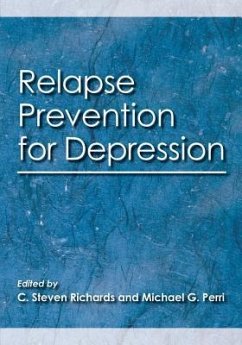Relapse Prevention for Depression
Herausgeber: Richards, C. Steven; Perri, Michael G.
Relapse Prevention for Depression
Herausgeber: Richards, C. Steven; Perri, Michael G.
- Gebundenes Buch
- Merkliste
- Auf die Merkliste
- Bewerten Bewerten
- Teilen
- Produkt teilen
- Produkterinnerung
- Produkterinnerung
Summarizes the progress regarding the theory, research, and practice of relapse prevention for depression. This title also discusses the four treatments with the most empirical support for preventing depressive relapse: cognitive - behavior therapy, interpersonal therapy, problem-solving therapy, and pharmacotherapy.
Andere Kunden interessierten sich auch für
![Adapting Cognitive Therapy for Depression Adapting Cognitive Therapy for Depression]() Mark A. Whisman (ed.)Adapting Cognitive Therapy for Depression62,99 €
Mark A. Whisman (ed.)Adapting Cognitive Therapy for Depression62,99 €![Relapse Prevention for Addictive Behaviours Relapse Prevention for Addictive Behaviours]() S. WanigaratneRelapse Prevention for Addictive Behaviours54,99 €
S. WanigaratneRelapse Prevention for Addictive Behaviours54,99 €![Relapse Prevention for Sexual Harassers Relapse Prevention for Sexual Harassers]() Kirk A. BrunswigRelapse Prevention for Sexual Harassers53,99 €
Kirk A. BrunswigRelapse Prevention for Sexual Harassers53,99 €![Depression and Anxiety Disorders: Diagnosis and Treatment Depression and Anxiety Disorders: Diagnosis and Treatment]() Depression and Anxiety Disorders: Diagnosis and Treatment139,99 €
Depression and Anxiety Disorders: Diagnosis and Treatment139,99 €![Metacognitive Therapy for Anxiety and Depression Metacognitive Therapy for Anxiety and Depression]() Adrian WellsMetacognitive Therapy for Anxiety and Depression76,99 €
Adrian WellsMetacognitive Therapy for Anxiety and Depression76,99 €![Therapist's Guide to Evidence-Based Relapse Prevention Therapist's Guide to Evidence-Based Relapse Prevention]() Katie A. Witkiewitz / G. Alan Marlatt (eds.)Therapist's Guide to Evidence-Based Relapse Prevention45,99 €
Katie A. Witkiewitz / G. Alan Marlatt (eds.)Therapist's Guide to Evidence-Based Relapse Prevention45,99 €![NEW MIND-BODY SCIENCE OF DEPRE NEW MIND-BODY SCIENCE OF DEPRE]() Vladimir MaleticNEW MIND-BODY SCIENCE OF DEPRE47,99 €
Vladimir MaleticNEW MIND-BODY SCIENCE OF DEPRE47,99 €-
-
-
Summarizes the progress regarding the theory, research, and practice of relapse prevention for depression. This title also discusses the four treatments with the most empirical support for preventing depressive relapse: cognitive - behavior therapy, interpersonal therapy, problem-solving therapy, and pharmacotherapy.
Produktdetails
- Produktdetails
- Verlag: American Psychological Association (APA)
- Seitenzahl: 288
- Erscheinungstermin: März 2010
- Englisch
- Abmessung: 264mm x 187mm x 27mm
- Gewicht: 727g
- ISBN-13: 9781433807282
- ISBN-10: 1433807289
- Artikelnr.: 28880258
- Herstellerkennzeichnung
- Libri GmbH
- Europaallee 1
- 36244 Bad Hersfeld
- gpsr@libri.de
- Verlag: American Psychological Association (APA)
- Seitenzahl: 288
- Erscheinungstermin: März 2010
- Englisch
- Abmessung: 264mm x 187mm x 27mm
- Gewicht: 727g
- ISBN-13: 9781433807282
- ISBN-10: 1433807289
- Artikelnr.: 28880258
- Herstellerkennzeichnung
- Libri GmbH
- Europaallee 1
- 36244 Bad Hersfeld
- gpsr@libri.de
C. Steven Richards is a professor at the Department of Psychology, Texas Tech University. He received his bachelor's degree in psychology from the University of Minnesota–Minneapolis in 1969 and his doctorate in clinical psychology from the State University of New York at Stony Brook in 1973. Prior to joining the faculty at Texas Tech University in 1990, he was on the faculty at the University of Missouri–Columbia (1973–1984) and Syracuse University (1984–1990). His primary research interest is depression, but he has also conducted research on health psychology, self-control, and stress and coping. He and his research colleagues have been awarded grants and contracts from the National Institute of Mental Health, the American Cancer Society, the Head Start Program, and several other agencies and organizations. Dr. Richards has contributed to approximately 60 publications, including Depression (Richards & Perri, 2002, Sage) and peer-reviewed articles in the Journal of Consulting and Clinical Psychology, the Journal of Counseling Psychology, Behavior Therapy, Behaviour Research and Therapy, Cognitive Therapy and Research, Annals of Behavioral Medicine, Behavior Modification, Eating Behaviors, the Canadian Journal of Behavioural Science, and Teaching of Psychology. He has been heavily involved in service during his career, including 13 administrative appointments at universities and service on nearly 300 administrative committees since 1973. He has also contributed pro bono service to the profession, such as extensive service to the American Psychological Association and 10 other professional associations. He has served on seven journal editorial boards and he provided ad hoc reviewing for 31 journals. Dr. Richards' diverse contributions as a teacher, advisor, and mentor have been recognized through seven teaching awards. Michael G. Perri is a professor in the Department of Clinical and Health Psychology at the University of Florida, where he is the dean of the College of Public Health and Health Professions. He received his bachelor's degree in psychology from Fordham University in 1973 and his doctorate in clinical psychology from the University of Missouri–Columbia in 1978. Prior to joining the faculty of the University of Florida in 1990, he held academic appointments at the University of Rochester, the Indiana University School of Medicine, and Fairleigh Dickinson University. In addition to his interest in depression, his research has centered on the development of lifestyle interventions for health promotion through changes in diet and physical activity. His research has been funded since 1980 by grants and contracts from the National Institutes of Health, the Department of Veterans Affairs, and private industry. Dr. Perri has contributed to more than 100 publications, including peer-reviewed articles in The New England Journal of Medicine, the Journal of the American Medical Association, Archives of Internal Medicine, Diabetes Care, Preventive Medicine, Health Psychology, the Journal of Consulting and Clinical Psychology, and Behavior Therapy. He has served on the editorial boards of Health Psychology, Annals of Behavioral Medicine, Eating Behaviors, the Journal of Consulting and Clinical Psychology, ACSM's Health & Fitness Journal, and Psychology of Addictive Behaviors. Dr. Perri is a diplomate in clinical psychology of the American Board of Professional Psychology, and he is a fellow of the American Psychological Association, the Society of Behavioral Medicine, and the North American Association for the Study of Obesity. He is the 2008 recipient of the Samuel M. Turner Award from the Society of Clinical Psychology of the American Psychological Association, which was awarded for distinguished contributions to applied research in clinical psychology.
Contributors
Acknowledgments
Introduction: The Relapse Problem in Depression
—C. Steven Richards and Michael G. Perri
I. Risk Assessment for Relapse
1. Recurrence in Major Depression: Assessing Risk Indicators in the
Context of Risk Estimates
—Scott M. Monroe
II. Treatment Approaches to Relapse Prevention
1. Cognitive Behavior Therapy and Relapse Prevention for Depression
—Claudi L. H. Bockting, Philip Spinhoven, and Marcus Huibers
2. Interpersonal Psychotherapy and Relapse Prevention for Depression
—Michael W. O'Hara, Crystal Edler Schiller, and Scott Stuart
3. Problem-Solving Therapy for Relapse Prevention in Depression
—Arthur M. Nezu and Christine Maguth Nezu
4. Pharmacotherapy and Relapse Prevention for Depression
—Christos Ballas, Tami D. Benton, and Dwight L. Evans
III. Special Populations
1. Preventing Depression Relapse in Older Adults
—Patricia A. Arean and Liat Ayalon
2. Relapse Prevention of Suicide Attempts: Application of Cognitive
Therapy
—Gregory K. Brown, Shannon Wiltsey Stirman, and Megan Spokas
3. Depression and Chronic Medical Illness: Implications for Relapse
Prevention
—Timothy W. Smith
4. Relapse Prevention for Depression in Individuals With Substance Use
Disorders
—Elizabeth E. Epstein, Kelly E. Green, and Michelle L. Drapkin
5. Marital Distress and Relapse Prevention for Depression
—Mark A. Whisman and Yael Chatav Schonbrun
Epilogue: Top 10 Guidelines for Practitioners
—C. Steven Richards and Michael G. Perri
Index
About the Editors
Acknowledgments
Introduction: The Relapse Problem in Depression
—C. Steven Richards and Michael G. Perri
I. Risk Assessment for Relapse
1. Recurrence in Major Depression: Assessing Risk Indicators in the
Context of Risk Estimates
—Scott M. Monroe
II. Treatment Approaches to Relapse Prevention
1. Cognitive Behavior Therapy and Relapse Prevention for Depression
—Claudi L. H. Bockting, Philip Spinhoven, and Marcus Huibers
2. Interpersonal Psychotherapy and Relapse Prevention for Depression
—Michael W. O'Hara, Crystal Edler Schiller, and Scott Stuart
3. Problem-Solving Therapy for Relapse Prevention in Depression
—Arthur M. Nezu and Christine Maguth Nezu
4. Pharmacotherapy and Relapse Prevention for Depression
—Christos Ballas, Tami D. Benton, and Dwight L. Evans
III. Special Populations
1. Preventing Depression Relapse in Older Adults
—Patricia A. Arean and Liat Ayalon
2. Relapse Prevention of Suicide Attempts: Application of Cognitive
Therapy
—Gregory K. Brown, Shannon Wiltsey Stirman, and Megan Spokas
3. Depression and Chronic Medical Illness: Implications for Relapse
Prevention
—Timothy W. Smith
4. Relapse Prevention for Depression in Individuals With Substance Use
Disorders
—Elizabeth E. Epstein, Kelly E. Green, and Michelle L. Drapkin
5. Marital Distress and Relapse Prevention for Depression
—Mark A. Whisman and Yael Chatav Schonbrun
Epilogue: Top 10 Guidelines for Practitioners
—C. Steven Richards and Michael G. Perri
Index
About the Editors
Contributors
Acknowledgments
Introduction: The Relapse Problem in Depression
—C. Steven Richards and Michael G. Perri
I. Risk Assessment for Relapse
1. Recurrence in Major Depression: Assessing Risk Indicators in the
Context of Risk Estimates
—Scott M. Monroe
II. Treatment Approaches to Relapse Prevention
1. Cognitive Behavior Therapy and Relapse Prevention for Depression
—Claudi L. H. Bockting, Philip Spinhoven, and Marcus Huibers
2. Interpersonal Psychotherapy and Relapse Prevention for Depression
—Michael W. O'Hara, Crystal Edler Schiller, and Scott Stuart
3. Problem-Solving Therapy for Relapse Prevention in Depression
—Arthur M. Nezu and Christine Maguth Nezu
4. Pharmacotherapy and Relapse Prevention for Depression
—Christos Ballas, Tami D. Benton, and Dwight L. Evans
III. Special Populations
1. Preventing Depression Relapse in Older Adults
—Patricia A. Arean and Liat Ayalon
2. Relapse Prevention of Suicide Attempts: Application of Cognitive
Therapy
—Gregory K. Brown, Shannon Wiltsey Stirman, and Megan Spokas
3. Depression and Chronic Medical Illness: Implications for Relapse
Prevention
—Timothy W. Smith
4. Relapse Prevention for Depression in Individuals With Substance Use
Disorders
—Elizabeth E. Epstein, Kelly E. Green, and Michelle L. Drapkin
5. Marital Distress and Relapse Prevention for Depression
—Mark A. Whisman and Yael Chatav Schonbrun
Epilogue: Top 10 Guidelines for Practitioners
—C. Steven Richards and Michael G. Perri
Index
About the Editors
Acknowledgments
Introduction: The Relapse Problem in Depression
—C. Steven Richards and Michael G. Perri
I. Risk Assessment for Relapse
1. Recurrence in Major Depression: Assessing Risk Indicators in the
Context of Risk Estimates
—Scott M. Monroe
II. Treatment Approaches to Relapse Prevention
1. Cognitive Behavior Therapy and Relapse Prevention for Depression
—Claudi L. H. Bockting, Philip Spinhoven, and Marcus Huibers
2. Interpersonal Psychotherapy and Relapse Prevention for Depression
—Michael W. O'Hara, Crystal Edler Schiller, and Scott Stuart
3. Problem-Solving Therapy for Relapse Prevention in Depression
—Arthur M. Nezu and Christine Maguth Nezu
4. Pharmacotherapy and Relapse Prevention for Depression
—Christos Ballas, Tami D. Benton, and Dwight L. Evans
III. Special Populations
1. Preventing Depression Relapse in Older Adults
—Patricia A. Arean and Liat Ayalon
2. Relapse Prevention of Suicide Attempts: Application of Cognitive
Therapy
—Gregory K. Brown, Shannon Wiltsey Stirman, and Megan Spokas
3. Depression and Chronic Medical Illness: Implications for Relapse
Prevention
—Timothy W. Smith
4. Relapse Prevention for Depression in Individuals With Substance Use
Disorders
—Elizabeth E. Epstein, Kelly E. Green, and Michelle L. Drapkin
5. Marital Distress and Relapse Prevention for Depression
—Mark A. Whisman and Yael Chatav Schonbrun
Epilogue: Top 10 Guidelines for Practitioners
—C. Steven Richards and Michael G. Perri
Index
About the Editors








